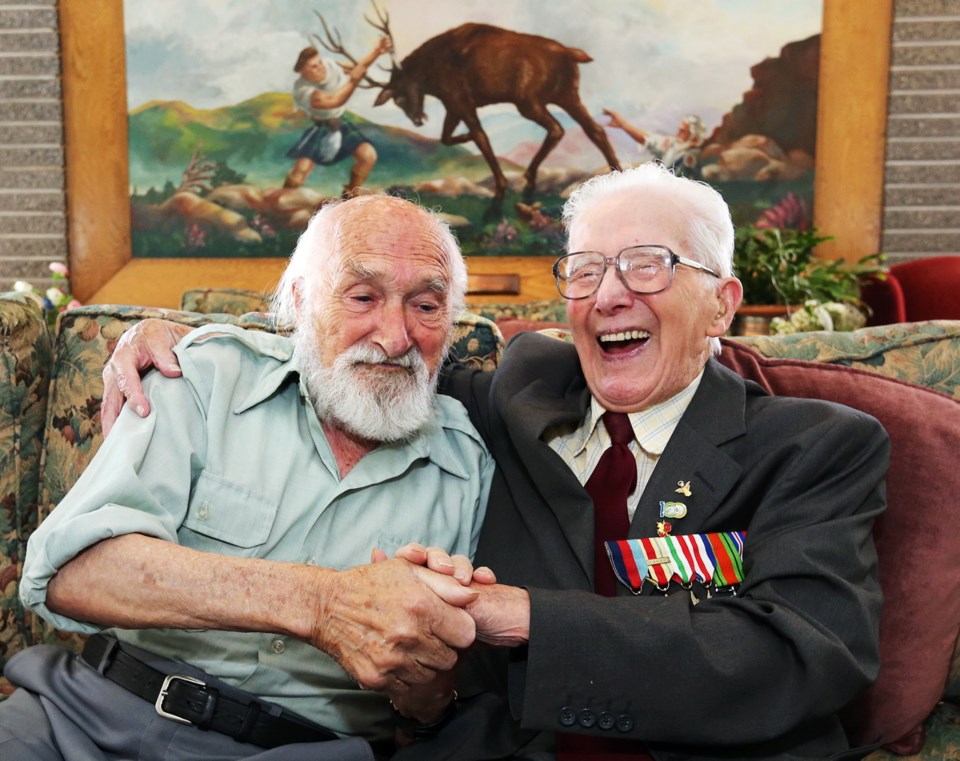Alf Trueman and Henry Demski have much in common.
Both live in Victoria’s Glenshiel seniors home. Both celebrate a birthday today. They share a sense of humour.
Good thing they didn’t shoot each other in 1942.
Both men, they recently discovered, fought in one of the most famous battles of the Second World War — on opposite sides.
Alfred Trueman served in Britain’s Eighth Army — the Desert Rats — while Karl Heinrich Demski was in Germany’s Afrika Korps when the tide of the war turned at El Alamein, Egypt.
“If we’d seen each other, we would have been going like this,” says the 102-year-old Trueman, stabbing at Demski, 92, with an imaginary bayonet. “Now we’re doing this,” he says, shaking his friend’s hand.
Trueman was born in Yorkshire on July 31, 1911, quit school to work in the coal mines at 14, then joined the army when the Depression hit.
He served in India through the 1930s (he once saw Gandhi from a distance) then in Europe, was among the retreating Allied soldiers plucked from a French beach in 1940’s Miracle of Dunkirk.
Demski was a Berliner, still a teen when sent first to Naples, then to North Africa as an anti-aircraft gunner. Facing him in Egypt was Trueman, who drove a Bren gun carrier in the Yorkshire and Lancashire Regiment.
Each man served under his country’s most-celebrated military leader.
Trueman remembers Field Marshal Bernard Montgomery giving a pep talk before the battle. “We’re going to knock Rommel for six, going to beat the Germans, then go back to England,” Monty told the circle of soldiers.
“He went back to England,” Trueman observes. “We didn’t.”
Demski actually did sentry duty at the sleeping quarters of Field Marshal Erwin Rommel, the legendary Desert Fox. “You’re going to catch a cold,” Rommel once told him, fastening an open button on Demski’s shirt. Rommel was forced into suicide in 1944 after being implicated in the bomb plot that almost killed Adolf Hitler.
The Battle of El Alamein in October 1942 was a turning point in the war, leading to the surrender of Axis forces in North Africa the next spring. “Before Alamein, we never had a victory,” Winston Churchill later wrote. “After Alamein, we never had a defeat.”
Trueman and Demski both came close to death in the campaign. One soldier was killed, another wounded, when Trueman’s Bren carrier hit a landmine. A mine blew a wheel off Demski’s truck, too. Years after the war, Demski’s wife was still picking shrapnel out of his legs.
Smoking once saved the German’s life: out of cigarettes, Demski popped over to a neighbouring foxhole. Returning to his own, he found it obliterated by shellfire.
As the fighting wound down, so did the will to kill. “The last week, nobody likes to shoot anymore,” he says. “Nobody likes to die anymore.”
Twice, when on reconnaissance in the desert, Demski was shooed back to his own lines by Allied soldiers. The sides were close enough to see the glow of the other’s pre-dawn cigarettes but refrained from firing. Once, when the melody of Lili Marlene drifted over from the British side, the Germans sang along. “The English were tired of the war, and we, too.”
 The Germans surrendered en masse in May 1943. As a prisoner of war, Demski was eventually shipped to France and put to work in a coal mine. Trueman went on to the Sicily and Italy campaigns, was part of 1944’s landing at Anzio, near Rome.
The Germans surrendered en masse in May 1943. As a prisoner of war, Demski was eventually shipped to France and put to work in a coal mine. Trueman went on to the Sicily and Italy campaigns, was part of 1944’s landing at Anzio, near Rome.
After the war, Trueman moved to Canada with his first and only love, Connie, whom he had met at age 17. He worked at Butchart Gardens for three years, spent another 20 years as a letter carrier (he was the first one in Langford) until retiring. Alf and Connie had been married 56 years when she died in 1994.
Demski met his soulmate, Eva, in 1948, marrying her in 1950. They’re still married. They have been in Canada since 1959, in Victoria since the mid-1990s.
Their last two years have been at the Glenshiel, which is where Demski and Trueman discovered their common past while chatting one day.
Demski has an affable disposition, Eva says, just like his friend Trueman.
Trueman, a cheerful imp, often has a wartime ditty on his lips (he sticks to the tame versions when his 74-year-old daughter is around).
He refers to himself as being in “middle age,” though he admits to feeling “ancient” relative to Demski. The erstwhile enemies ham it up like an old Vaudeville team.
“If Rommel could see us now,” says Trueman, nudging Demski.
“My brother,” says Demski, patting Trueman on the hand.



